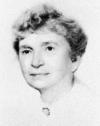- Sanger, Margaret
-
born Sept. 14, 1879, Corning, N.Y., U.S.died Sept. 6, 1966, Tucson, Ariz.U.S. birth-control pioneer.She practiced obstetrical nursing on New York's Lower East Side, where she noticed a relationship between poverty, uncontrolled fertility, and high rates of infant and maternal deaths. In 1914 she published The Woman Rebel (later Birth Control Reviews), which was banned as obscene. She was arrested in 1916 for mailing birth-control literature and again when she opened the country's first birth-control clinic. Her legal appeals brought publicity and support to her cause, and the federal courts soon granted physicians the right to prescribe contraceptives. In 1921 she founded the American Birth Control League. She soon took her campaign worldwide, organizing the first World Population Conference (1927) and becoming the founding president of the International Planned Parenthood Federation (1953).
 Margaret Sanger.By courtesy of Planned Parenthood-Federation of America, Inc.
Margaret Sanger.By courtesy of Planned Parenthood-Federation of America, Inc.* * *
▪ American social reformeroriginal name Margaret Louisa Higginsborn Sept. 14, 1879, Corning, N.Y., U.S.died Sept. 6, 1966, Tucson, Ariz.founder of the birth-control (birth control) movement in the United States and an international leader in the field. She is credited with originating the term birth control.The sixth of 11 children, she attended Claverack College and then took nurse's training in New York at the White Plains Hospital and the Manhattan Eye and Ear Clinic. She was married twice, to William Sanger in 1900 and, after a divorce, to J. Noah H. Slee in 1922. After a brief teaching career she practiced obstetrical nursing on the Lower East Side of New York City, where she witnessed the relationships between poverty, uncontrolled fertility, high rates of infant and maternal mortality, and deaths from botched illegal abortions (abortion). These observations made Sanger a feminist who believed in every woman's right to avoid unwanted pregnancies, and she devoted herself to removing the legal barriers to publicizing the facts about contraception.In 1912 Sanger gave up nursing to devote herself to the cause of birth control. In 1914 she issued a short-lived magazine, The Woman Rebel, and distributed a pamphlet, Family Limitation, advocating her views. She was indicted for mailing materials advocating birth control, but the charges were dropped in 1916. Later that year she opened in Brooklyn the first birth-control clinic in the United States. She was arrested and charged with maintaining a “public nuisance,” and in 1917 she served 30 days in the Queens penitentiary. While she was serving time, the first issue of her periodical The Birth Control Review was published. Her sentencing and subsequent episodes of legal harrassment helped to crystallize public opinion in favour of the birth-control movement. Sanger's legal appeals prompted the federal courts first to grant physicians the right to give advice about birth-control methods and then, in 1936, to reinterpret the Comstock Act of 1873 (which had classified contraceptive literature and devices as obscene materials) in such a way as to permit physicians to import and prescribe contraceptives.In 1921 Sanger founded the American Birth Control League, and she served as its president until 1928. The league was one of the parent organizations of the Birth Control Federation of America, which in 1942 became the Planned Parenthood Federation of America, with Sanger as honorary chairman. Sanger, who had traveled to Europe to study the issue of birth control there, also organized the first World Population Conference in Geneva in 1927, and she was the first president of the International Planned Parenthood Federation (founded 1953). Subsequently she took her campaign for birth control to Asian countries, especially India and Japan.Among her numerous books are What Every Mother Should Know (1917), My Fight for Birth Control (1931), and Margaret Sanger: An Autobiography (1938).Additional ReadingBiographies include Emily Taft Douglas, Margaret Sanger: Pioneer of the Future (1970); David M. Kennedy, Birth Control in America: The Career of Margaret Sanger (1970); and Ellen Chesler, Woman of Valor: Margaret Sanger and the Birth Control Movement in America (1992).* * *
Universalium. 2010.
